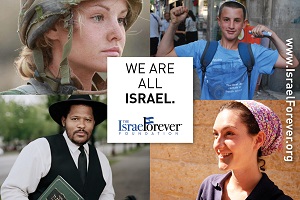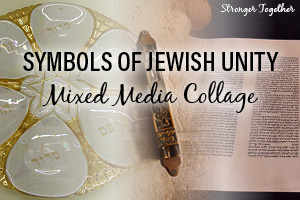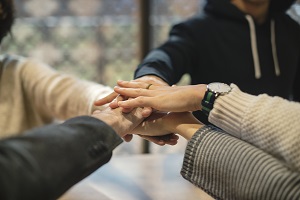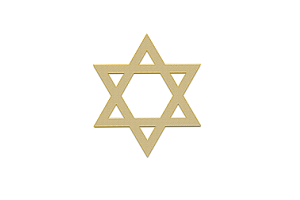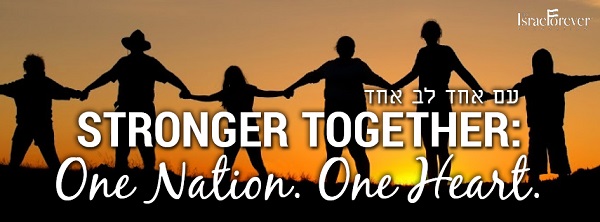Limits of Labels: Addressing the Challenges to Jewish Unity
ACTIVITY INSTRUCTIONS:
Israel Forever’s “Limits of Labels” activities can be run together as a single program or used as individual, stand alone activities:
1. Jewish labels: trigger statements
2. Labels of religious observance
3. Ethnic origins: labels born from exile
4. Home: labels of geography
5. Am Yisrael - can we call ourselves one?
Target age: High schoolers, campus students, young professionals
Total program time: Approx 1 hour
Program Goals: This program will engage participants in an exploration of the labels we impose - on each other, and on ourselves. Each of the following activities presents a different category of labels by utilizing various articles, quotes, and videos, in order to open up discussion. You will find guiding questions at the end of each subsection - these questions may be used to open up a dialogue.
Options for running this program:
1) Break up into three small groups and hand out activities 1-3 giving one to each group. Each of the three activities are based around various sub-groups within the Jewish community and the distance they create between us as a unified people. After each group has looked at the activities and talking through the discussion questions, have one individual from each present to the larger group (30 minutes).
Once each group has presented, introduce activity number four (“AM YISRAEL”) and discuss the questions that follow as one group (20 minutes).
OR
2) Jump directly to the section titled “AM YISRAEL” (Activity #4) and will be carried out as a group.
*The Ice Breaker activity should be used to kick-off either of these options.*
Download and print the activities here:
Jewish labels: trigger statements
Labels of religious observance
Ethnic origins: labels born from exile
Home: labels of geography
Am Yisrael - can we call ourselves one?
Am Yisrael - can we call ourselves one? - Activity Option 2
ACTIVITY OPTION #1
Jewish Labels - Trigger Statements
ICEBREAKER: What do these trigger statements mean to you?
READ ALOUD
We all have our own ideas surrounding how we identify with being a Jew. For some it is their level of religious observance; for others it is in regards to their ethnic and cultural background; and for others it is the innate connection they feel to the land of Israel - the home of the Jewish people.
To begin, we are going to respond to various “Trigger Statements” as a group. The answers can be called out at random, or written down on paper. (10 minutes)
- Being “part of the Jewish people” makes me feel like …
- Being “part of the Jewish people” connects me to …
- Being “part of the Jewish people” gives me the opportunity to …
- Being “part of the Jewish people” adds meaning to my life because …
- Being “part of the Jewish people” positively shapes the way I …
- Being “part of the Jewish people” helps me to …
AFTER TRIGGER STATEMENT DISCUSSION:
Have participants discuss a comment thread between their responses to the above. How would they define “the Jewish people?” Do they feel a sense of connection to “the Jewish people?” Why or why not? (This will help guide the narrative for the activity).
LABELS OF RELIGIOUS OBSERVANCE
INTRO: (Read aloud)
Jews are most often labeled by their levels of religious observance, the synagogue they belong to, and how they publicly identify. There exists layers upon layers of subcategories within each faction of Jewish observance. Whereas these subcategories allow us to express our individuality, itself a part of the intrinsic beautify of the Jewish religion, these divisions have also prevented us from knowing how to accept each other. Most strikingly, it is these divisions that sit at the forefront of the many disparities within our homeland, the land of Israel.
How can we continue to let our own differences further divide us within the land that is supposed to be an equal home to all? How can we begin to accept one another more openly, so that our common cause has the power of unity behind it?
We are now going to asses various quotes and videos that will cultivate a greater discussion around this topic. There will be a couple of guiding questions in between the sources along with ones that create a discussion around the topic as a whole.
QUOTES: (Read aloud)
An anonymous quote that was posted as a Pre-Rosh Hashannah Message: “Shana Tova to modern, ultra & just plain Orthodox Jews, Haredi Jews, Mitnagdim, Chasidim, Conservative, Conservadox, Reform & ConForm Jews, Gartel Jews, non-Gartel Jews, Jews with sheitels & without, Tichel Jews, sheitel, tichel & hat Jews, frum from birth Jews, baalei teshuva, black hat, kipa s'ruga, payos in front of the ear Jews, payos in back of the ear Jews, kipa only in shul / hat in shul / no shul at all Jews, [Mizrahi Jews, Aguda Jews, Jews by choice, bathrobe on Friday night Jews, cardiac Jews, Black Jews, White Jews, 3-day-a-year Jews, JTS, RJJ, HUC, HTC, MTJ, BMT Jews, NCSY Jews, feminist Jews, traditional Jews, Kaddish Jews, political Jews, intellectual Jews, tomato Jews & orange Jews, Birthright Jews, single Jews, married Jews, wish I was married Jews, Galitzianers, Litvaks, Polacks, Greener Jews, Redder Jews, Jews in kapatas, Jews in T-shirts, Hungarian Jews, Romanian Jews, Czech Jews, Jews on the Hungarian-Czech Border Jews, Ashkenazim, Sefardim, Yemenite Jews, Jews with an accent, Jews who speak perfect Midwestern English Hebrew, Zionists, non-Zionists, anti-Zionists, post-Zionists, closet Jews, shnorrers, baalei tzedaka, tzadikim, Kohanim, Levi'im, Yisraelim, machers, m'vinim, & poshet Jews, EVERY KIND of Jew in this vast Universe: May we all unite - without a fight!]”
How do you feel when you hear so many subcategories physically listed out? (OPEN TO RESPONSES FROM GROUP - 2 to 5 minutes)
WATCH:
The Rabbi and the Israeli Taxi Driver
Does watching these videos breakdown your outlook on the division between religious and secular Jews? (OPEN TO RESPONSES FROM GROUP - 2 to 5 minutes)
DISCUSSION QUESTIONS:
- Why do we feel pressured to categorize based on our level of observance?
- Why do we yearn for such a belonging?
- Why do we find it difficult to appreciate all the different ways we are able to express our Judaism?
- What does it mean to you that a Jew can be practicing or not-practicing but still undoubtedly identify themselves as a Jew?
ETHNIC ORIGINS: LABELS BORN FROM EXILE
INTRO (Read aloud):
Sephardic, Ashkenazic, Mizrahi and Ethiopian Jews. These are deeply rooted labels that trace each one of us back to our ancestors, creating a direct link to the origin of our familiar cultural practices. This expresses itself different for each community. For many, it meant growing up with Friday night dinners, Pesach Seders, and the celebration of Rosh Hashanah - in whatever format it took. For others it meant a mitzvah observant lifestyle, living according to the Torah laws. But embedded within these different ways of practice is a strong connection that creates the culture we all feel so automatically tied to. Judaism is not simply a religion; it’s a culture; a way of life that binds us all together.
While we should all remain proud of our distinct backgrounds and way of living, it’s also important to understand the common struggles we face.
Further, it’s important to recognize that we all belong to the same land; Israel became a common home for Jews of all backgrounds and continues to be a place for all.
(Same as in Part 1: We are now going to asses various quotes and videos that will cultivate a greater discussion around this topic. There will be a couple of guiding questions in between the sources along with ones that create a discussion around the topic as a whole.)
QUOTES: (Read aloud)
“Shared Jewish history, rituals, laws, and values unify an international Jewish community. However, the divergent histories of Jewish communities and their contacts with other cultural influences distinguish Jewish ethnic groups from one another, giving each a unique way of being Jewish.
….
Many Jews today live a multi-layered Jewish existence. Some Ethiopian Jews attend Hasidic yeshivas, and some Sephardic Jews enjoy matzah ball soup at their Passover seders. Jews from all backgrounds often borrow each other’s cultural traditions. Many populous Jewish communities have a diverse range of ethnicities, and that diversity presents itself even within individual families.”
Source
What are some ways that you connect to your ethnic Jewish background?
(OPEN TO RESPONSES FROM GROUP - 2 to 5 minutes)
WATCH:
Sephardic, Ashkenazic, Mizrahi and Ethiopian Jews
OVERARCHING DISCUSSION QUESTIONS:
- Do you necessarily identify with one of the above backgrounds? If so, why; and if not, why?
- Do you think Jews of different origins have issues finding common ground? If yes, Why?
- What are some of the positive attributes of having so many ethnicities tied into one religion?
HOME: LABELS OF GEOGRAPHY
INTRO (Read aloud):
There is a commonly understood lack of connection between Israeli and Diaspora Jews. Much of the time, being in Israel seems to complete the picture for people, leaving them with no need to see beyond the physical borders. Similarly, many Jews in the Diaspora (America and elsewhere) see within the confines of their homebred community borders, and don’t sense the necessity to look beyond.
Interestingly enough, even though we tend not to look past our borders on a day to day basis, when tragedy strikes one of our community members, whether in Israel, France, the US, or elsewhere, we all feel the pain. We all react. There is no you and me. We automatically become us.
(Same as in Part 1: We are now going to asses various quotes and videos that will cultivate a greater discussion around this topic. There will be a couple of guiding questions in between the sources along with ones that create a discussion around the topic as a whole.)
QUOTES: (Read aloud)
Quote #1:
“‘We’ is our camp. ‘We’ is our community. But ‘We’ is also Israel, a place that they do not live, a place that they may not know as anything other than the mythical land of Torah stories and Zionist myths. Yet, they feel connected to the people of Israel, united in the face of tragedy.”
SourceQuote #2:
“Every so often I read about a Jew who lives in the Diaspora who gives his opinion of what Israel should or should not do. Then an Israeli retorts saying the Diaspora Jew has no business telling Jews in Israel how to live their lives. Generally the logic goes something like: ‘You are a national of a foreign county. You reside and vote in that country by your choice. We don't tell your country what to do, so don't tell us what to do.’Generally the verbiage is varied, but the message is the same: ‘If you want to give us your opinion of Israeli politics, come live in Israel, share our burden, and we will listen.’”
Source
WATCH:
The Challenge of Being Jewish in the Diaspora - Start at 1:07; End at 2:10 (Rachel Korpus)
DISCUSSION QUESTIONS:
- Do you feel a connection to Israeli Jews? To other American / European / Latin / African / Asian Jews?
- What are some scenarios you’ve been in where you felt this unspoken connection?
- How can Diaspora Jews create a greater dialogue with Israeli Jews?
- Do you feel that Diaspora Jews have a valid voice when it comes to issues directly pertaining to Israel? Why or why not?
“AM YISRAEL” Can We Call Ourselves One?
INTRO (Read aloud): While we may all feel a pressure to label ourselves, maybe there is a way to move away from that. A way to truly feel unified and part of a Jewish Nation, a Jewish Peoplehood.
(Same as in Part 1: We are now going to asses various quotes and videos that will cultivate a greater discussion around this topic. There will be a couple of guiding questions in between the sources along with ones that create a discussion around the topic as a whole.)
QUOTES: (Read Aloud)
“Both those who meticulously define subgroups and those who refuse to play the labeling game take denominational designations way too seriously. If the recent and much-discussed Pew Research Center study of American Jewry is any indication, American Jews treat denominational affiliation as a function of identity and even use the terms “identity” and “affiliation”— two distinct concepts — almost interchangeably. For Pew, the opposite of a denominationally identified Jew is an unaffiliated Jew.” - Elli Fischer“The bonds of Jewish peoplehood are not unbreakable. If we keep dividing ourselves, pushing away that which we don’t like and clinging only to what’s comfortable, we’ll wake up one day without a Jewish people. We’ll have small circles of like-minded people, but no eternal bond, linking us through time and space.” - Samantha Vinokor
“...I am arguing for a perspective through which all of Jewish life is seen as constitutive of the broader Jewish collective, of Jewish Peoplehood. If we hold onto a Jewish Peoplehood consciousness, we won’t consider any of these issues without bearing in mind that the Jewish People is a global collective, with a multi-faceted civilization that provide sources of inspiration and resources for the future, for all Jews wherever they are.” - Clare Goldwater
WATCH:
Why am I a Jew? - Rabbi Sacks
Lack of Jewish Unity is the Source of Anti-Semitism
DISCUSSION QUESTIONS:
- Through your discussions, do you feel that while your opinions may differ, you have many of the same questions and issues as your counterparts?
- How may that help us to look beyond our own personal stance and see eye-to-eye with others?
- Why do non-Jews see us as one Jewish nation (i.e. anti-semitism is directed at all of us - not one group versus another) but we ourselves don’t feel this unity?
- If we take away the ability to label, would you still be able to describe your Jewish identity?
- What really makes you Jewish? Do you feel part of a “Jewish Peoplehood” as it’s portrayed above?
- How would you describe the concept of “Jewish Peoplehood” in your own words?
- How can we maintain these labels while still seeing ourselves as a “Jewish Peoplehood”?
- How does recognizing Jewish Peoplehood as a central component of Jewish identity help us better connect with the Jewish state? And how does our connection to the Jewish state of Israel help us better appreciate our inclusion in the global Jewish peoplehood?
ACTIVITY OPTION #2
“AM YISRAEL” Can We Call Ourselves One?
ICEBREAKER:
(Read aloud): We all have our own ideas surrounding how we identify with being a Jew. For some it is their level of religious observance; for others it is in regards to their ethnic background; and for others it is the innate connection they feel to the land of Israel - the home of the Jewish people.
Have the group respond to the following “Trigger Statements:” Answers can be called out at random, or written down on paper. (10 minutes)
- Being “part of the Jewish people” makes me feel like …
- Being “part of the Jewish people” connects me to …
- Being “part of the Jewish people” gives me the opportunity to …
- Being “part of the Jewish people” adds meaning to my life because …
- Being “part of the Jewish people” positively shapes the way I …
- Being “part of the Jewish people” helps me to …
AFTER TRIGGER STATEMENT DISCUSSION: Have participants discuss a comment thread between their responses to the above. How would they define “the Jewish people?” Do they feel a sense of connection to “the Jewish people?” Why or why not? (This will help guide the narrative for the activity).
INTRO: (Read aloud) Many of us identify with various labels when it comes to our Jewish background - Ashkenazi Jew, Ethiopian Jew, Diaspora Jew; the list is endless. While these labels are not negative, they do create an unnecessary separation at times and lead many to feel isolated if they don’t directly belong to such a subcategory. Further, the immense subcategorization causes us as a Jewish Nation to be disunified, making it harder to defend ourselves both internally and externally. This activity looks to explore how we can still identify with these labels while still remaining cognizant of the fact that we are part of a Jewish Nation; or a Jewish Peoplehood.
We are now going to asses various quotes and videos that will cultivate a greater discussion around this topic. There will be a couple of guiding questions in between the sources along with ones that create a discussion around the topic as a whole.
QUOTES: (Read Aloud)
“Both those who meticulously define subgroups and those who refuse to play the labeling game take denominational designations way too seriously. If the recent and much-discussed Pew Research Center study of American Jewry is any indication, American Jews treat denominational affiliation as a function of identity and even use the terms “identity” and “affiliation”— two distinct concepts — almost interchangeably. For Pew, the opposite of a denominationally identified Jew is an unaffiliated Jew.” - Elli Fischer“The bonds of Jewish peoplehood are not unbreakable. If we keep dividing ourselves, pushing away that which we don’t like and clinging only to what’s comfortable, we’ll wake up one day without a Jewish people. We’ll have small circles of like-minded people, but no eternal bond, linking us through time and space.” - Samantha Vinokor
“...I am arguing for a perspective through which all of Jewish life is seen as constitutive of the broader Jewish collective, of Jewish Peoplehood. If we hold onto a Jewish Peoplehood consciousness, we won’t consider any of these issues without bearing in mind that the Jewish People is a global collective, with a multi-faceted civilization that provide sources of inspiration and resources for the future, for all Jews wherever they are.” - Clare Goldwater
*Open up for comments before moving on to the videos.*
WATCH:
Why am I a Jew? - Rabbi Sacks (6.5 minutes)
Lack of Jewish Unity is the Source of Anti-Semitism (recommended but may skip this if you are short on time - 3 minutes)
DISCUSSION QUESTIONS:
(can break up into groups or do as a collective group)
- What really makes you Jewish? Do you feel part of a “Jewish Peoplehood” as it’s portrayed above?
- How would you describe the concept of “Jewish Peoplehood” in your own words?
- Why do you feel non-Jews see us as one Jewish nation (i.e. anti-semitism is directed at all of us - not one group versus another) but we ourselves don’t feel this unity?
- If we take away the ability to label, would you still be able to describe your Jewish identity?
- How can we maintain these labels while still seeing ourselves as a collective “Jewish People”?
- How does recognizing Jewish Peoplehood as a central component of Jewish identity help us better connect with the Jewish state? And how does our connection to the Jewish state of Israel help us better appreciate our inclusion in the global Jewish peoplehood?

